Why does this photo make me think of Bruegel?
This summer has been exceptional for reading. I'm always immersed in books, but in the last few weeks, I've hit the fiction trifecta–that experience of reading one excellent book after another is a little too rare. So this week's CYB shares some of those books, along with AI reads and a great David Hockney find–-a unique documentary made in 1973.
READING
Long Island Compromise, by Taffy Brodesser-Akner. This is a masterful comedy of manners about American Reform Jews in a highly well-drawn place and time (New York, 1970s/80s/90s). It explores the long-term impact of generational family trauma with sharp wit. If you know the milieu (I grew up in the town she is satirizing), it's excellent, and if you don't, it's still a unique and funny novel with so many sharp truths.
All Fours, by Miranda July. Yeah, this is THE book club novel of the summer for many people, but it’s also a book that ratchets into a stratosphere of brilliance in the last third of the book, making the reader reconsider everything that’s gone before in a new way. For a novel about creativity, desire, internal life vs everyday life, and what endurance means, this turns All Fours into a meditation on existence that’s right up there with Erica Jong's 1973 Fear of Flying as a forerunner of female consciousness.
Slow River by Nicola Griffith. I was a Nicola Griffith fan in the 90s when I first read this book, but rereading it this summer has turned me into one of those passionate readers who has to devour all of Griffith’s work, both the books new to me and the old favorites. Griffith’s books have a certain gritty darkness that moves me, but also a poetry I can’t get enough of. Slow River tells the story of Lore, a waif, against the oddly fascinating backdrop of a drama centering on water waste treatment in near future, and it’s a good read.
FOCUS ON AI
Mastering AI in Nonprofits: Essential Resources to Enhance Your Impact. For those interested in AI and nonprofits, I've created an index of my posts about working with AI in nonprofits. Key subject areas organize it to make accessing this information more accessible. Whether you're beginning your AI journey or looking to refine your skills, these articles provide insights to navigate the possibilities of AI in your nonprofit work.
Who Audits the Auditors? Recommendations from a field scan of the algorithmic auditing ecosystem by Sasha Costanza-Chock, Emma Harvey, Inioluwa Deborah Raji, Martha Czernuszenko, Joy Buolamwini, This study, co-authored by well-known researchers Costanza-Chock and Buolamwini, looks at the new practice of checking AI systems for problems. These checks, called AI audits, aim to spot issues like unfairness, poor performance, or rule-breaking in AI tools that make decisions. The authors suggest ways to improve these checks, which can help nonprofits push for more responsible AI development and use.
Fall Virtual AI Workshops and Training: Still seeking input from nonprofit leaders. I'm also planning Fall virtual AI workshops and training and seeking input from nonprofit leaders. If you'd like to help shape these upcoming workshops, please take this quick survey. As a bonus, if you leave your name at the end of the survey, I'll enter you into a random drawing for one hour of free AI virtual coaching.
CULTURAL COMMENTARY AKA HOCKNEY,QUEERNESS AND EXERCISE
Mark Harris wrote a brilliant essay in August for the New York Times called "Gay Men Have Long Been Obsessed With Their Muscles. Now Everyone Is." This piece explores fitness and body types in gay culture (male), and how the objectification of a fit body is something we all now embrace. On the way, Harris references so many vital essays, films, photographers, and creators–this piece is like a course in consciousness–and I wish there was an equivalent essay about queer women and evolving body image over the past 50 years.
In his essay, Harris references a 1974 documentary about painter David Hockney called A Bigger Splash (after the title of a critical painting). He writes about "...the naked, tan men seen frolicking in a pool or taking a shower or having sex in the David Hockney quasi-documentary," which scandalized some moviegoers at the 1974 New York Film Festival. These men were lean and pretty but from a pre-gym era—"before the body thing started."
Of course, the minute I read that, I had to find the movie–which I did–streaming on Amazon and Apple TV. If you care about David Hockney or about queer culture or arts culture in the 70's, it's a must-watch. You can find more information about the film here.
And mainstream corporate media call out, great read here: Meredith Shiner, Beware the Pundit-Brained Version of the Democratic Convention, TNR.
Thank you for joining me on this journey! I hope CYB #55 had some interesting bits for you. And if you're new here and have found value, subscribe to Cover Your Bases to receive future issues in your inbox. I'm so grateful for your readership and engagement.
Warmly, Susan
Since you made it this far, Here’s Chappell Roan at Outside Lands (she killed it):




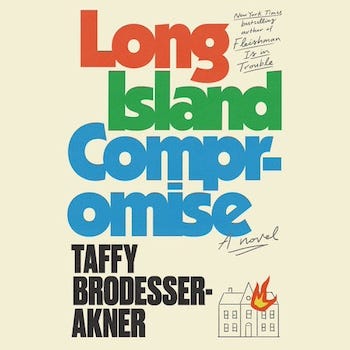
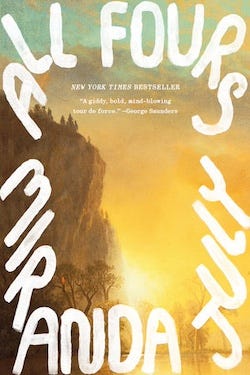
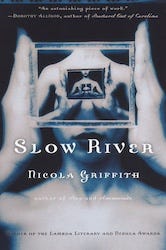
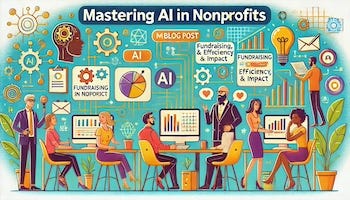

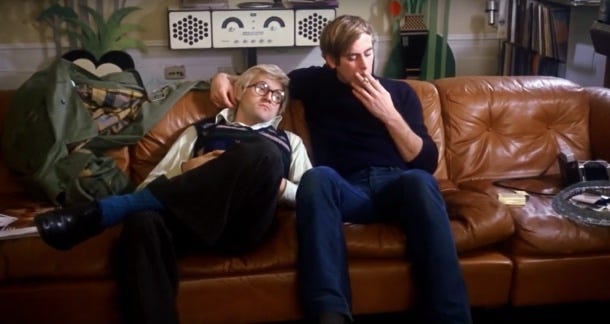
We need to discuss All Fours! I think halfway through the book I was so exhausted by the protagonist that I was trying to get through it and see if there was a payoff. When you reference the last third being so revelatory, I am struggling to even think of how so. I listened to the audio book and sometimes I wonder if I retain as well that way.